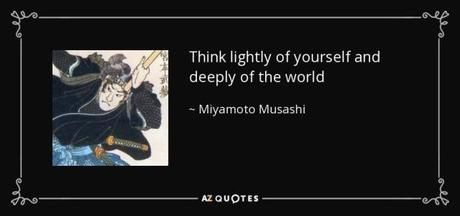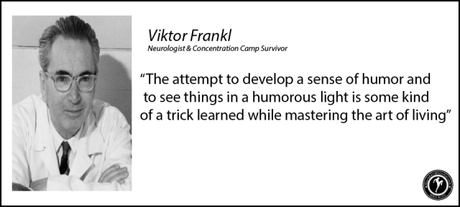Born in the 16th century, near the end of the Japanese civil war, Miyamoto Musashi was a nomadic samurai who fought in a small number of battles, but dozens of duals. He is known as Japan’s greatest swordsman.
The book has had a huge impact on culture in East Asia and on business etiquette.
There are several cross-overs in the book with Stoic philosophy and even Buddhist mindfulness, with Musashi emphasising several times:
Get Beyond Love and Grief
Live for the Good of Man
i.e. Don’t be overly dramatic, get on with what needs to be done without complaining.
Do Nothing that is of No Use
Don’t have a ‘flash’ fighting style, as this is of no practical use.
Don’t complain, as this has no use.
Step by Step Walk the Thousand Mile Path
Once you’ve determined where you want to be, be present in the moment and take it a step at a time.
Musashi also talks about being focused during a battle or dual or dying. He no doubt was an expert at achieving ‘flow state’ and achieved this by constant practice, rather than a typical form of meditation.

Again, the above quote makes me think of both Stoic & Buddhist philosophy.
Self-absorption is a distraction and useless when it comes to battle. It’s also pretty bad for your mental health.
In Strategy You Must Know The Ways of Other Schools
Basically the philosophy of MMA, JKD and cross-training in the martial arts. If you are a Gracie BJJ practitioner, you should still know the ways of Tenth Planet so you can defend or counter them.
A Thousand Days of Training to Develop. Ten Thousand Days of training to Polish
This quote sounds a lot like the 10,000 hours rule – to become a master at something, you need to practice for 10,000 hours. There’s also the 80/20 rule – in that you can gain 80% competency in 20% of the training required to become ‘masterful’ at something.
The 80/20 rule can actually be applied to lots of different scenarios – see this video.
Resentment and Complaint are Appropriate Neither for Oneself or Others
Complaining is pointless. Resentment is pointless. Both waste and take up energy, so don’t bother with either.
Do Not Act Following Customary Beliefs
Question everything. Conventional wisdom would have us belief that high carbohydrate diets are the healthiest – but are they? Lose your preconceived ideas and research it for yourself.
Accept Everything Just the Way it is
Another Stoic-like quote and reference to not being a complaining bellend. Change things if you can, if you cannot, accept them.
Never let Yourself by Saddened by a Separation
If someone dies, or leaves, be respectful but not saddened. This serves no purpose.
My favorite quotes from the book:
1. Do not seek pleasure for its own sake.
2. Accept everything just the way it is.
3. Never be jealous.
4. Think lightly of yourself and deeply of the world.
5. Be detached from desire your whole life long.
6. Do not regret what you have done.
7. Do not, under any circumstances, depend on a partial feeling.
8. Never let yourself be saddened by a separation.
9. Resentment and complaint are appropriate neither for oneself nor others.
10. Do not let yourself be guided by the feeling of lust or love.
11. In all things have no preferences.
12. Be indifferent to where you live.
13. Do not pursue the taste of good food.
14. Do not hold on to possessions you no longer need.
15. Do not act following customary beliefs.
16. Do not collect weapons or practice with weapons beyond what is useful.
17. Respect Buddha and the gods without counting on their help.
18. Do not seek to possess either goods or fiefs for your old age.
19. Do not fear death.
20. You may abandon your own body but you must preserve your honor.
21. Never stray from the Way.
22. Resentment and Compliant are Appropriate Neither for Oneself or Others
23. Never Fear Death
The only thing I would potentially add to Musashi’s teachings for modern day use, would be to have an enduring sense of humor – as outlined in Victor Frankl’s Book Man’s Search for Meaning – a dark sense of humor & sense of purpose helped him to survive the concentration camps:

Having said that, Musashi gave zero fucks so maybe didn’t require any level of comic relief, as he would not have seen a dual or battle as a hardship or something to be endured – next level shit.

